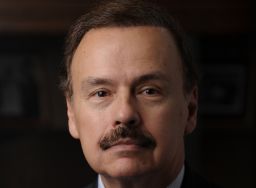Editor’s Note: Jimmy Gurulé is a law professor at Notre Dame and a former under secretary for enforcement at the US Department of the Treasury, assistant attorney general for the Justice Department’s Office of Justice Programs, and assistant US attorney. The views expressed in this commentary are solely his.
Story highlights
Jimmy Gurulé suggests readers read the law and compare it to the events unfolding in Washington
It seems the actions of Donald Trump meet some of the required criteria for obstruction of justice, he says
To say that President Donald Trump’s decision to fire FBI Director James Comey has raised concerns would be an understatement.
President Trump’s claims that this dismissal was justified based on Comey’s handling of the Hillary Clinton email scandal are curious, given that during the presidential campaign, then-candidate Trump enthusiastically praised and applauded Comey’s decision to reopen the Clinton investigation – after initially rebuking Clinton for her carelessness and concluding she had committed no crime. Back then, Donald Trump portrayed Comey’s actions as a profile in courage. So what accounts for this sudden and dramatic change of opinion?

Ultimately, Comey may have been fired not because he wasn’t doing a good job, as Trump claims, but because he was doing his job too well – and that’s bad news for the President, because it puts him within range of obstruction of justice charges. Evidence that Trump engaged in obstruction of justice could serve as the basis of impeachment proceedings.
Two significant events may explain this bizarre turn of events. First, grand jury subpoenas were recently served on associates of former national security adviser Michael Flynn, indicating the FBI investigation was aggressively moving forward. As a former federal prosecutor, I have conducted dozens of grand jury investigations and subpoenaing someone to testify is a serious matter. Witnesses testify under oath and knowingly making a material false statement could result in perjury charges. Moreover, witnesses are not subpoenaed to testify before a federal grand jury unless they are suspected of having knowledge or evidence of a crime. Obviously, this was not good news for the Trump administration, who desperately want to change the narrative and terminate the criminal investigation.
Second, days before his firing, Comey requested a significant increase in money and personnel to expand the scope of the FBI inquiry involving the Russians and Trump’s campaign, according to news reports. The Justice Department denied this allegation. A request for additional resources would mean the FBI had identified significant evidentiary leads that needed to be investigated more fully. It seems likely the FBI investigation was proceeding forward with no end in sight.
Views on Comey's firing
If the President’s real reason for firing Comey was to derail or obstruct the FBI investigation into possible collusion between the Russians and Trump associates to influence the outcome of the presidential election, this could warrant serious legal consequences. More specifically, Trump’s actions could constitute obstruction of justice, a federal felony offense.
Most obstruction of justice charges are filed under the omnibus clauses of 18 U.S.C. § 1503 and § 1505, where the government must prove that: (1) the defendant acted with “corrupt” intent (in this case, intent to interfere with or thwart the investigation); (2) the defendant endeavored to interfere with a pending judicial proceeding; (3) there was a sufficient “nexus” between the defendant’s actions and the pending proceeding (the actions were likely to affect the judicial proceedings); and (4) the defendant acted with knowledge that the judicial proceedings were pending. Further, and most critically in this case, the defendant need not actually obstruct the pending judicial proceeding, but only “endeavor” to do so.
If you read the law and compare it to the events unfolding, it seems the actions of Donald Trump and his administration meet some of the required criteria. Trump fired Comey amid a pending grand jury investigation into possible collusion between his campaign and the Russians. Witnesses had been subpoenaed to appear before that grand jury. Further, Trump was likely aware of the pending grand jury proceedings, since he was constantly obsessed with the Russian investigation, and, by firing Comey, attempted to disrupt and interfere with those proceedings. Ultimately, the fundamental issue is whether Trump fired Comey with a “corrupt” intent, meaning to obstruct or impede the federal grand jury investigation. If so, President Trump committed a federal crime.
Get our free weekly newsletter
The firing of FBI Director Comey raises these and other serious legal questions that carry significant political implications. As such, I believe the situation requires the appointment of an independent counsel to try to answer the question of whether the president is guilty of obstruction of justice.




